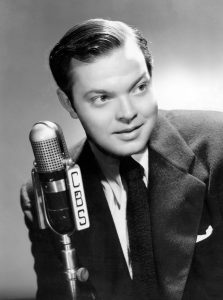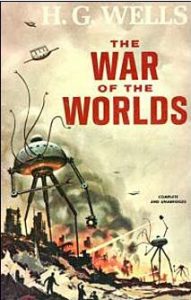 At a time when television was in the very early stages of its existence, and not really available to the public, people got their entertainment from the radio. People listened to everything from news, to music, to fictional shows, which were of course, acted out only by the actors verbalizing the parts. Most of the shows were a normal story line, probably often Westerns, and so the people were able to distinguish the fiction from the news. On this day, October 30, 1938, all that changed, when the Mercury Theater company decided to put Orson Welles on the radio in the H.G. Wells novel, War Of The Worlds. Welles had previously been the voice of The Shadow, which apparently was not a show that the people took seriously, even though it was scary. The same would not be true with War Of The Worlds, which was a dramatization of a Martian invasion of Earth. I find it odd that people would believe either show, but that is beside the point.
At a time when television was in the very early stages of its existence, and not really available to the public, people got their entertainment from the radio. People listened to everything from news, to music, to fictional shows, which were of course, acted out only by the actors verbalizing the parts. Most of the shows were a normal story line, probably often Westerns, and so the people were able to distinguish the fiction from the news. On this day, October 30, 1938, all that changed, when the Mercury Theater company decided to put Orson Welles on the radio in the H.G. Wells novel, War Of The Worlds. Welles had previously been the voice of The Shadow, which apparently was not a show that the people took seriously, even though it was scary. The same would not be true with War Of The Worlds, which was a dramatization of a Martian invasion of Earth. I find it odd that people would believe either show, but that is beside the point.
Orson Welles was just 23 years old when War Of The Worlds was first broadcast on air, but he had been in radio for several years. The War Of The Worlds show was not planned to be a radio hoax, and Welles had no idea of the havoc the show would cause. The show began on Sunday, October 30, at 8 pm. A voice announced: “The Columbia Broadcasting System and its affiliated stations present Orson Welles and the Mercury Theater on the air in ‘War of the Worlds’ by H.G. Wells.” Sunday evening was considered prime time in the world of 1938 radio. Apparently, the show prior to this one wasn’t very good, and so many people tuned in too late to hear the announcement that the War Of The Worlds was a science fiction story, and the story was already underway. Welles introduced his radio play with a spoken introduction, followed by an announcer reading a weather report. Then, the announcer seemingly abandoned the storyline, and took listeners to “the Meridian Room in the Hotel Park Plaza in downtown New York, where you will be entertained by the music of Ramon Raquello and his orchestra.” Dance music played for a while, and then the scare began. An announcer broke in to report that “Professor Farrell of the Mount Jenning Observatory” had detected explosions on the planet Mars. Then the dance music came back on, followed by another interruption in which listeners were informed that a large meteor had crashed into a farmer’s field in Grovers Mills, New Jersey. At this point, those who tuned in late, were wondering what was going on, and maybe the ones who tuned in on time were wondering too.
Soon, an announcer was at the crash site describing a Martian emerging from a large metallic cylinder. “Good heavens,” he declared, “something’s wriggling out of the shadow like a gray snake. Now here’s another and another one and another one. They look like tentacles to me…I can see the thing’s body now. It’s large, large as a bear. It glistens like wet leather. But that face, it… it…ladies and gentlemen, it’s indescribable. I can hardly force myself to keep looking at it, it’s so awful. The eyes are black and gleam like a serpent. The mouth is kind of V-shaped with saliva dripping from its rimless lips that seem to quiver and pulsate.” The story continued when the announcer said, “The Martians mounted walking war machines and fired ‘heat-ray’ weapons at the puny humans gathered around the crash site. They annihilated a force of 7,000 National Guardsman, and after being attacked by artillery and bombers the Martians released a poisonous gas into the air.” Then they declared that “Martian cylinders” had landed in Chicago and St. Louis. The radio play was extremely realistic. Welles even used sophisticated sound effects and his talented actors did an excellent job portraying terrified announcers and other characters. An announcer reported that “widespread panic had broken out in the vicinity of the landing sites, with thousands desperately trying to flee.”
In fact, that was not far from the truth, because as many as a million radio listeners believed the invasion was real. Panic broke out across the country. In this day and age, this all seems crazy, because we have seen every possible invasion story imaginable, but back then, not so much. In New Jersey, terrified people reportedly hit the highways seeking a way of escape from the alien invasion. People begged police for gas masks to save them from the toxic gas and asked electric companies to turn off the power so that the Martians wouldn’t see  their lights. One woman ran into an Indianapolis church where evening services were being held and yelled, “New York has been destroyed! It’s the end of the world! Go home and prepare to die!”
their lights. One woman ran into an Indianapolis church where evening services were being held and yelled, “New York has been destroyed! It’s the end of the world! Go home and prepare to die!”
When the studio heard of the panic, Orson Welles went on the air as himself to remind listeners that it was just fiction. It was reported that the show caused suicides, but that was never confirmed. The Federal Communications Commission investigated the program, but found no law was broken. Networks did agree to be more cautious in their programming in the future. Orson Welles worried that the controversy would ruin his career, but the opposite was true. The publicity helped him to land a contract with a Hollywood studio, and in 1941 he wrote, directed, produced, and starred in Citizen Kane…a movie that many have called the greatest American film ever made. Of course, there are those who said that the whole thing was a hoax, but I guess we will never know for sure.


Leave a Reply